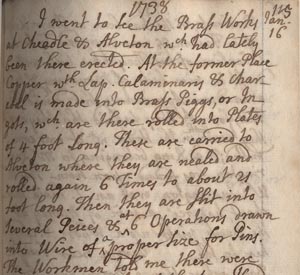
Archive sources
|
The rolling of copper and brass wire Account by Dr Richard Wilkes of Willenhall of a visit to the Brass Works at Cheadle and Alton, January 1738 (5350) Dr Wilkes’ was a physician who kept a very general daily journal. He had interests in many different matters. This diary contains a mixture of unusual medical cases that he had dealt with or heard about, other personal activities, and also news-worthy items taken from the local and London newspapers. This section relates to a visit to the brass works at Cheadle and Alton. These were run by the Cheadle Copper & Brass Company, which had recently started in Staffordshire in 1734, making use of copper mined in the Moorlands. This extract explains the process of first rolling the ingots into plates. These were then transferred to another site, heated and then rolled again into lengths of “wire”. This process strengthened the metal. The end-use mentioned was for making brass pins. As with many processes, there were a range of specialised workers. A wages account book from the 1840s lists “Rollermen, Metal Rollers (Nealers etc). Wire Strip Rollers (Slitters and Wenders), Casters, Smiths, Millwrights, Engineers, Wire Drawers, Fine Wire, Rumplers, Thick Wire, Rumple Rolls, Nealers and Picklers etc.”, as well as Warehousemen and Labourers. The Cheadle firm was eventually taken over by Thomas Bolton who founded a company with his sons, and expanded the works. In 1857 their product was used for the first successful telegraphic cable across the English Channel, and for the first successful cable across the Atlantic in 1866. |
